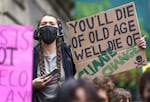Anger. Guilt. Shame.
Young people in Oregon say they’re experiencing these emotions as they face the impacts of climate change, according to a study released on Tuesday by the Oregon Health Authority.
The agency’s report, Climate Change and Youth Mental Health in Oregon, highlights how extreme weather events like wildfires, heatwaves, snowstorms and drought are creating fear, frustration, and hopelessness among young people. OHA partnered with the University of Oregon’s suicide prevention unit to host virtual focus groups with people between ages 15 and 25 and interviewed professionals working in mental health, education and public health.
“We want to see more youth mental health support in schools and in our communities,” Mecca Donovan, a 23-year-old from Eugene, said. “We want to see youth invited to the table and decision making.”
Donovan, who helped host the focus groups, said she wants to see more accountability and acknowledgment of the challenges young people are facing.

Thousands of area youth climate activists and supporters marched through downtown Portland on May 20, 2022. The Oregon Health Authority issued a report on Tuesday detailing the impacts of climate change on the mental health of young Oregonians.
Kristyna Wentz-Graff / OPB
One of the key findings from the report said young people often feel dismissed by older generations and not taken seriously by elected leaders.
“Burnout is just really, really bad,” Eliza Garcia, a recent UO political science graduate, said. “I think that’s the biggest thing that I’ve felt within the movement and the biggest thing that I’ve had other people my age or younger than me talk to me about, it’s just the burnout that comes from having to feel like we’re doing this all alone.”
Garcia said she felt pressured to switch her focus to climate justice because more action is needed.
“I felt very much I had to work on it and very much like, ‘if I’m not working on this issue right now, then what am I doing?’” she said.
Garcia said she’s turned down events and opportunities so she can fight against climate change and that pressure has affected her mental health. She said she’s particularly concerned about younger activists.
“Now there’s kids, you know, middle school, like, beginning of high school that are getting into it and when you’re starting that young, I can see that these kids are getting burnt out already and they’re not even 20 yet,” she said.
Andres De La Rosa-Hernandez, 25, is a peer-to-peer support specialist in Monmouth. He provides support for people between the ages of 14 to 25 and helps them with life changes or issues they are going through. He said a major concern is all the climate change information young people receive on social media.
“They see an article about the polar ice caps melting or about rising water, anything like that it’s hard for them to focus on whatever they’re working on when they think about how the world is ending around them,” De La Rosa-Hernandez said.
He said he’s also feeling the same burnout from having to deal with so much at once. Most of the people in his circle also feel the same way.

Shayanne Summers holds her dog Toph while wrapped in a blanket after several days of staying in a tent at an evacuation center at the Milwaukie-Portland Elks Lodge on Sunday, Sept. 13, 2020, in Oak Grove, Ore. "It's nice enough here you could almost think of this as camping and forget everything else, almost," said Summers about staying at the center after evacuating from near Molalla, Ore., which was threatened by the Riverside Fire.
John Locher / AP
A conversation he has repeatedly had with his wife is whether they want to have children and what their future would look like. De La Rosa-Hernandez said they ask themselves if they really want to bring a child into such an uncertain world.
Another emotion De La Rosa-Hernandez deals with is survivors’ guilt. During the 2020 Labor Day fires, he said he received messages from friends that their homes were on fire or had to evacuate. This prompted him to pack his bags and be ready to go but his area did not have to evacuate.
“While I was very thankful to the universe that I didn’t have to evacuate, I didn’t lose all my stuff, I stopped and thought about everyone who did lose things and ended up with a survivor’s guilt of ‘why was it me?” he said. “Like is it just the area I’m living in? Why did the universe, I guess in a way punish them and not me?’”
Julie Early Sifuentes, an OHA program manager and the study’s lead author, said the report was designed to elevate youth voices and to better understand what steps are needed to help youth feel hopeful. She said she hopes the report will generate conversations among families and local organizations and inform policy decisions within state and city agencies.
OHA completed the report under Gov. Kate Brown’s executive order 20-04 which directs state agencies to act and regulate greenhouse gas emissions and study the harmful effects of climate change. The report concluded with the importance of sharing power in decision-making about climate and mental health policy and solutions. It also suggested increasing funds for mental health services to provide for schools and communities in need.
